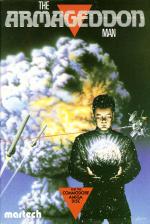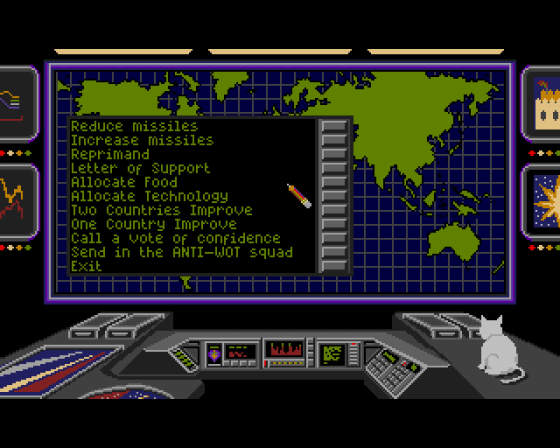
Commodore User
 1st June 1988
1st June 1988
Author: Gary Whitta
Publisher: Martech
Machine: Amiga 500
Published in Commodore User #58
The Armageddon Man
Hmmm. Martech have certainly made a strange choice of game with which to enter the Amiga market. The Armageddon Man didn't make too much of an impact in any of its 8-bit incarnations, but throwing caution to the wind, Martech have decided to convert it anyway, and to be fair they haven't made a bad job of it.
The plot is heavy-duty stuff. It's 2032 AD and the world's sixteen major superpowers have formed an alliance in order to prevent themselves from microwaving each other to death through nuclear war. In control of the alliance is a huge mega-satellite that constantly monitors the state of the world, and in control of the satellite is you, the Armageddon Man, who has the job of keeping nuclear war at bay.
The game itself is totally icon controlled with four major options available, each represented by a small display on your master console. 'Information' gives you the low-down on the current state of the world, telling you who's got the most missiles, food and technology. Using this info you can pick out any potential troublemaking nations. The In and Out trays are used to communicate with the rest of the world. All of the sixteen nations will write to you, and when you receive a letter or memo, you are given a small list of options with which to reply. For example, when you are told that a Pakistani mob has attacked an American Embassy you can decide to be neutral, support the action or criticise it. Not exactly the Earth-shattering decisions I was expecting to make, but there you go.

The Out tray provides a small list or prepared letters than you can send to any country at any time, used to allocate food to starving nations and so on.
With the satellite option, you can move your SDI satellites around the world to provide cover to countries that may be under threat. In the event of a war the satellites will knock out any missiles that come within range. You can also position your radio satellites over certain countries and spy on their radio transmissions. This brings me nicely on to the radio option.
The radio allows you to scan the airwaves for any important signals (I tried to pick up Simon Bates but was fortunate enough to fail). If in the course of scanning, you pick up a transmission, it's presented in scrambled form, and in order to read it you need to fiddle around with six toggles which, if set correctly, will decipher it. Not that it's really worth it, hardly any of the messages are of any real importance, or give any clues as to what's going on in the world below.
All this may sound like an interesting game, but unfortunately it isn't. There simply isn't enough interaction to get you really involved, and even when you do make seemingly important decisions, they hardly make any difference at all, and before you know it, nuclear war erupts for no reason and the game ends. These flaws are only partly made up for by the excellent bad-relief graphics and atmospheric sound effects. A game like this stands or falls on its gameplay, and there isn't enough to let this compete with a game like Balance Of Power. Still, if you're a fan of world crises, you should enjoy this, for a short while at least.





